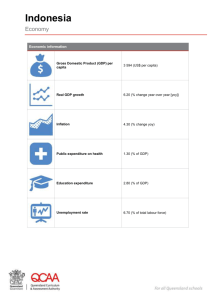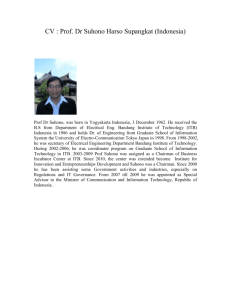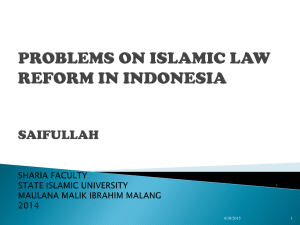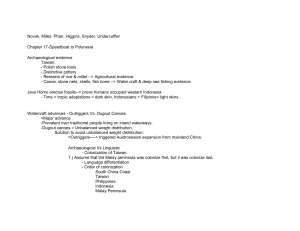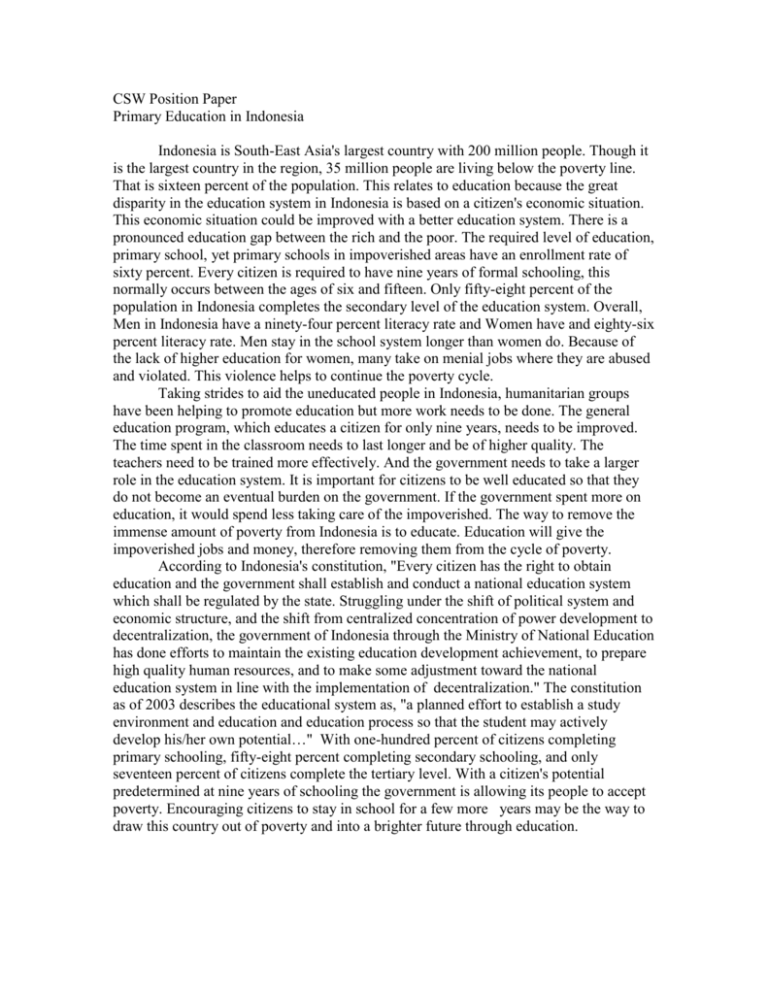
CSW Position Paper
Primary Education in Indonesia
Indonesia is South-East Asia's largest country with 200 million people. Though it
is the largest country in the region, 35 million people are living below the poverty line.
That is sixteen percent of the population. This relates to education because the great
disparity in the education system in Indonesia is based on a citizen's economic situation.
This economic situation could be improved with a better education system. There is a
pronounced education gap between the rich and the poor. The required level of education,
primary school, yet primary schools in impoverished areas have an enrollment rate of
sixty percent. Every citizen is required to have nine years of formal schooling, this
normally occurs between the ages of six and fifteen. Only fifty-eight percent of the
population in Indonesia completes the secondary level of the education system. Overall,
Men in Indonesia have a ninety-four percent literacy rate and Women have and eighty-six
percent literacy rate. Men stay in the school system longer than women do. Because of
the lack of higher education for women, many take on menial jobs where they are abused
and violated. This violence helps to continue the poverty cycle.
Taking strides to aid the uneducated people in Indonesia, humanitarian groups
have been helping to promote education but more work needs to be done. The general
education program, which educates a citizen for only nine years, needs to be improved.
The time spent in the classroom needs to last longer and be of higher quality. The
teachers need to be trained more effectively. And the government needs to take a larger
role in the education system. It is important for citizens to be well educated so that they
do not become an eventual burden on the government. If the government spent more on
education, it would spend less taking care of the impoverished. The way to remove the
immense amount of poverty from Indonesia is to educate. Education will give the
impoverished jobs and money, therefore removing them from the cycle of poverty.
According to Indonesia's constitution, "Every citizen has the right to obtain
education and the government shall establish and conduct a national education system
which shall be regulated by the state. Struggling under the shift of political system and
economic structure, and the shift from centralized concentration of power development to
decentralization, the government of Indonesia through the Ministry of National Education
has done efforts to maintain the existing education development achievement, to prepare
high quality human resources, and to make some adjustment toward the national
education system in line with the implementation of decentralization." The constitution
as of 2003 describes the educational system as, "a planned effort to establish a study
environment and education and education process so that the student may actively
develop his/her own potential…" With one-hundred percent of citizens completing
primary schooling, fifty-eight percent completing secondary schooling, and only
seventeen percent of citizens complete the tertiary level. With a citizen's potential
predetermined at nine years of schooling the government is allowing its people to accept
poverty. Encouraging citizens to stay in school for a few more years may be the way to
draw this country out of poverty and into a brighter future through education.
Prevention of Violence and Protection of Women during Conflict and Crisis:
Indonesia, CSW
Indonesia is the world's fourth most populous nation with 234,693,997
people. About half of these are women. When taking a close look at how women are
treated in this country, it is found that they are treated extremely unfairly. There are
currently 29 laws that are gender-based in Indonesia. There are not any laws, however,
protecting against sexual discrimination, such as unfair wages and lack of proper
employment benefits. Men, unlike women, are even able to commit polygamy and girls
of sixteen or seventeen years of age are allowed to marry. Besides just these inequalities
between men and women, however, several crimes are also committed against
women. These include economic and physical violence and sexual and psychological
crimes. More than 75% are committed in the home and they are usually done by public
servants, policemen, soldiers, or children under seventeen. Lately there has also been the
issue of mass rape among ethnic groups, especially the Chinese. When it comes to
working in the military, women are allowed to enroll. However, it is required that they
are virgins to do so. Plus, several do not look towards the military for help because it is
one of the sources of the crimes committed against them. Instead, many women work in
factories or have relatively low paying jobs. Basically, women are becoming the victims
of the difficulties occurring in Indonesia.
In order to improve this situation, Indonesia has a Constitution that guarantees
human rights. It has also ratified some important international laws regarding human
rights, including ones involving cultural, social, and economic rights along with stepping
towards the elimination of discrimination against women. A few national laws have also
been created in order to protect women and children from violence. While it has helped
some, there is still more that needs to be done. Two in particular, the Protection for
Domestic Violence Act and Protection for Trafficking Act, have proven to be
effective. The Asia Foundation has also supported a wide range of economic, legal,
educational, and political improvements to help out the status of women in Indonesia.
We believe that certain programs should be put in place to help these Indonesian
women. Protection from crimes and programs that help women find or fight for wellpaying jobs should be initiated. Discrimination should be eliminated and completely
outlawed, for women should be able to live equal lives compared to the men. There
should be more control within the military. The different armed forces should not be
capable of committing their own crimes against women. Their job is to protect their
citizens, not harm them. They are constantly viewed as inferior to the rest of their society,
but continue to live out their lives as the many women in their past did. They need to
take a stand for their rights, and the government should in return take action. Life for the
women should not continue to be like this. They should be able to live happily and
equally alongside the men in Indonesia.



